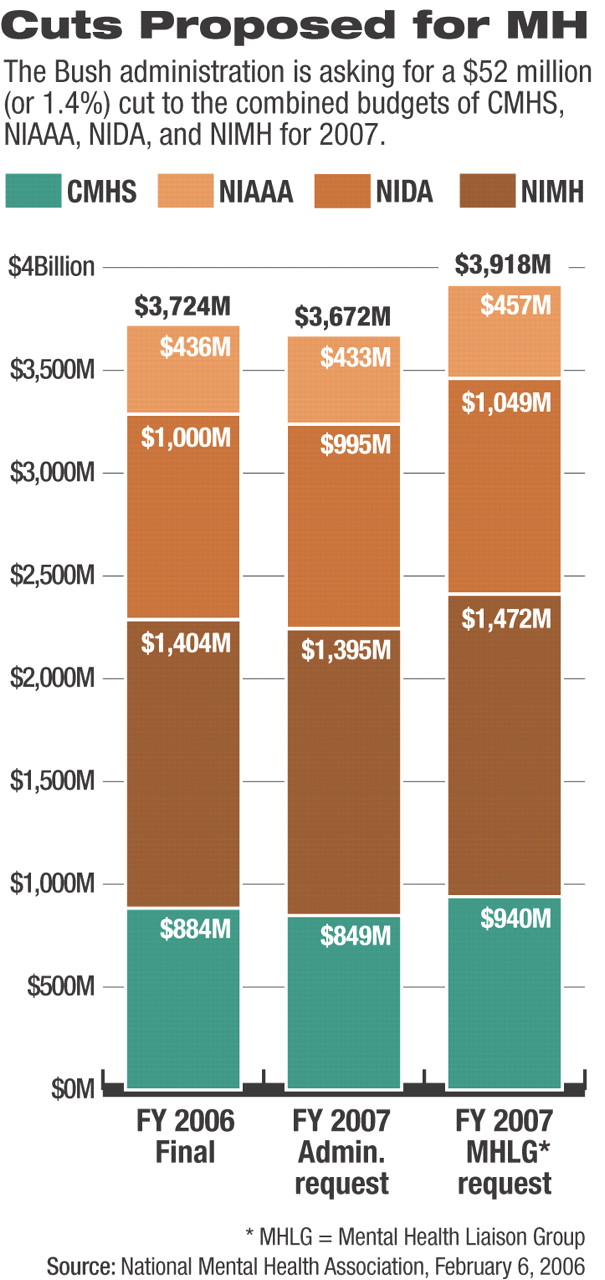Mental health programs would face a variety of cuts in President Bush's proposed $2.77 trillion Fiscal 2007 budget, released last month. The proposed budget would cut nondefense discretionary spending for the second straight year and save about $15 billion by eliminating or significantly reducing 141 programs.
Large savings of $65.2 billion over five years would stem from cuts in the growth of entitlement spending, including $35.9 billion in Medicare cuts over five years and $12 billion from Medicaid over 10 years.
The cuts may prove difficult to sustain in an election year, especially since Congress only recently cleared last year's hotly contested $39 billion savings package, which was the first since 1997 to slice Medicare, Medicaid, and several other entitlement programs (Psychiatric News, March 3). Republican leaders of Congress said the $11 billion in savings from Medicare and Medicaid in last year's package was not easy, and it may be too soon to seek more cuts.
“We remain hopeful in the fact that this midcycle election year will offer some protection to some health care programs because no one in an election year wants to be accused of recommending federal funding cuts that would hurt people who are poor or with disabilities,” said Lizbet Boroughs, deputy director of APA's Department of Government Relations (DGR).
The proposed budget seeks $698 billion for the Department of Health and Human Services (HHS), up from $677 billion in Fiscal 2006. Net Medicare costs are expected to reach $387 billion in Fiscal 2007, but discretionary spending would drop 4 percent, to $72.6 billion.
The Bush budget aims to slow the growth of Medicare through increased cost sharing for high-income seniors and reduced payments for some providers, including home health care agencies and hospitals. Much of that savings would be eaten up by the president's $29 billion proposal to expand the use of tax-free health savings accounts.
Medicaid Savings Sought
Medicaid funding would also be cut through changes to the formulas for drug reimbursement and by increasing rebates from drug manufacturers.
Funding for the National Institutes of Health (NIH) for Fiscal 2007 would be held to the Fiscal 2006 level, or $28.6 billion. Mental health advocates consider this a reduction, when an expected 3.5 percent rise in biomedical costs this year is considered.
“It gives us pause that we are backing away from what was for many years a national will to increase our investment in biomedical and severe illness research,” said Andrew Sperling, director of legislative advocacy at the National Alliance on Mental Illness (NAMI). “It is unfortunate that we have to back away from that now.”
The Substance Abuse and Mental Health Services Administration (SAMHSA) would be cut by $70 million, largely by changes to the State Mental Health Block Grant and State Substance Abuse Treatment Block Grant. The change would mandate that states receiving the grants establish a voucher system to reimburse the cost of health services provided by faith-based programs, a favored Bush administration initiative. The net effect is a cut in the block grants because this change would fund the vouchers through funds that were previously available for a range of projects under the block grant, said Boroughs.
Minority Training Would Be Cut
Other HHS proposed cuts include a $155 million reduction in the Health Professions Training Program, which targets minority and underserved populations.
“This is one of the few programs in the federal government that looks to train people to serve populations that historically have a very hard time accessing services,” Boroughs said. “It's a shame because that fellowship training program has been proven to work.”
Payments to children's hospitals for graduate medical education would be cut by $198 million.
The budget includes $169 million to accelerate progress in health information technology. The funding aims to promote nationwide interoperability of health information technology systems through industry-wide standardization.
The Department of Housing and Urban Development would see its Section 811 housing for people with disabilities cut in half, from $237 million in Fiscal 2006.
Department of Veterans Affairs (VA) funding would swell by 6 percent to $35.7 billion, although the increase is linked to new health care fees that Congress previously rejected. Without the new fees the discretionary total would rise 3 percent above Fiscal 2006, and funding for medical care would increase 8 percent. That would reverse the trend over the past two years in which VA funding proposals did not keep up with inflation.
The demand for VA services among veterans has grown, and the cost of long-term care has risen, which contributed to two consecutive budget shortfalls that totaled nearly $3 billion.
“These are record increases because of the increased demand on the system,” Sperling said about the veterans funding increases, which had been sought by NAMI.
Nearly $800 million of the VA increase would be paid for from a proposed new $250 enrollment fee and boosting drug co-payments from $8 to $15 per prescription for higher-income, less-disabled veterans.
APA officials told legislators in testimony for the Fiscal 2007 budget that it is concerned that some budget assumptions, such as the reliance on the collection of user fees and copays from veterans, might be overly ambitious if counted on to fund the entire budget increase. APA is concerned about the impact on the estimated 200,000 veterans it will affect including those who rely on the VA to pay for psychiatric medications.
Spending on VA medical care would see an 11 percent increase to $27.5 billion, if the fee proposals are rejected.
The president's budget proposals are posted at<www.whitehouse.gov/omb/budget/fy2007/>.▪

